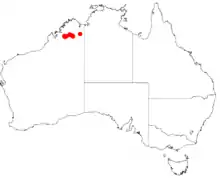Acacia capillaris
Acacia capillaris is a shrub belonging to the genus Acacia and the subgenus Lycopodiifoliae that is endemic to small area in north western Australia.
| Acacia capillaris | |
|---|---|
| Scientific classification | |
| Kingdom: | Plantae |
| Clade: | Tracheophytes |
| Clade: | Angiosperms |
| Clade: | Eudicots |
| Clade: | Rosids |
| Order: | Fabales |
| Family: | Fabaceae |
| Clade: | Mimosoideae |
| Genus: | Acacia |
| Species: | A. capillaris |
| Binomial name | |
| Acacia capillaris | |
 | |
| Occurrence data from AVH | |
Description
The erect shrub typically grows to a height of 0.4 to 1 metre (1 to 3 ft).[1] It has stems are covered in long and soft hairs that are around 1 mm (0.039 in) in length. The 3 to 4.5 mm (0.12 to 0.18 in) long spreading and yellowish stipules on the stems and branchlets are covered in bristly hairs. Like most species of Acacia it has phyllodes rather than true leaves. They are arranged in whorls containing 14 to 18 erect evergreen phyllodes. The adaxially flattened phyllodes are 5 to 9 mm (0.20 to 0.35 in) in length and covered in soft ascending to spreading white hairs.[2] It blooms in May and produces yellow flowers.[1] The spherical flower-heads contain 15 to 20 flowers. The glabrous brown seed pods that form after flowering have a flat and linear shape with a length of 1.5 to 4 cm (0.59 to 1.57 in) and a width of 4 to 4.5 mm (0.16 to 0.18 in) and have thickened margins. The pods contain two to eight seeds that are arranged longitudinally. The black seeds have an obliquely elliptic shape with a length of around 3.5 mm (0.14 in) with an open pleurogram.[2]
Taxonomy
The species was first formally described by the botanist Alexander Segger George in 1999 as part of the work Seven new species in Acacia section Lycopodiifolia (Mimosaceae) as published in the Journal of the Royal Society of Western Australia. It was reclassified as Racosperma capillare in 2003 by Leslie Pedley then transferred back to genusAcacia in 2006.[3] The type specimen was collected by R.J.Cranfield in 1988 from around Fern Creek in the Wunaamin-Miliwundi Ranges.[2]
Distribution
It is native to an area in the Kimberley region of Western Australia where it is commonly situated on steep rocky slopes or along creek lines growing in clay soils.[1] It is found around Mount Bell and Scott Gorge in the West Kimberley region growing in red-brown clay soils often over granite and is an understory plant commonly situated beneath Livistona palms as a part of savannah or spinifex communities.[2]
See also
References
- "Acacia capillaris". FloraBase. Western Australian Government Department of Parks and Wildlife.
- "Acacia capillaris". World Wide Wattle. Western Australian Herbarium. Retrieved 7 May 2020.
- "Acacia capillaris A.S.George". Atlas of Living Australia. Global Biodiversity Information Facility. 7 May 2020.
